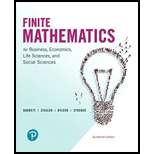
Concept explainers
In Problems 9-16, the matrix for a strictly determined game is given. Find the value of the game. Is the game fair?
Want to see the full answer?
Check out a sample textbook solution
Chapter 11 Solutions
Finite Mathematics for Business, Economics, Life Sciences and Social Sciences
Additional Math Textbook Solutions
Thinking Mathematically (6th Edition)
Elementary Statistics
Introductory Statistics
Algebra and Trigonometry (6th Edition)
Calculus: Early Transcendentals (2nd Edition)
Basic Business Statistics, Student Value Edition
- PLEASE SOLVE STEP BY STEP WITHOUT ARTIFICIAL INTELLIGENCE OR CHATGPT SOLVE BY HAND STEP BY STEParrow_forward21:46 MM : 0 % sparxmaths.uk/studer Sparx Maths + 13 24,963 XP Andrey Roura 1A ✓ 1B X 1C 1D Summary Bookwork code: 1B 歐 Calculator not allowed Write the ratio 3 : 1½ in its simplest form. 32 Menuarrow_forwardPLEASE SOLVE STEP BY STEP WITHOUT ARTIFICIAL INTELLIGENCE OR CHATGPT SOLVE BY HAND STEP BY STEParrow_forward
- 2.- Solve the following Homogeneous Differential Equation (xy + 3y²+x²)dx − (x² + 2xy)dy = 0 -arrow_forwardWrite a Regression summary explaining significance of mode, explaining regression coefficients, significance of the independent variables, R and R square. Premiums earned Net income Dividends Underwriting Gain/ Loss 30.2 1.6 0.6 0.1 47.2 0.6 0.7 -3.6 92.8 8.4 1.8 -1.5 95.4 7.6 2 -4 100.4 6.3 2.2 -8.1 104.9 6.3 2.4 -10.8 113.2 2.2 2.3 -18.2 130.3 3.0 2.4 -21.4 161.9 13.5 2.3 -12.8 182.5 14.9 2.9 -5.9 193.3 11.7 2.9 -7.6arrow_forward1. Show that the vector field F(x, y, z) = (2x sin ye³)ix² cos yj + (3xe³ +5)k satisfies the necessary conditions for a conservative vector field, and find a potential function for F.arrow_forward
 Discrete Mathematics and Its Applications ( 8th I...MathISBN:9781259676512Author:Kenneth H RosenPublisher:McGraw-Hill Education
Discrete Mathematics and Its Applications ( 8th I...MathISBN:9781259676512Author:Kenneth H RosenPublisher:McGraw-Hill Education Mathematics for Elementary Teachers with Activiti...MathISBN:9780134392790Author:Beckmann, SybillaPublisher:PEARSON
Mathematics for Elementary Teachers with Activiti...MathISBN:9780134392790Author:Beckmann, SybillaPublisher:PEARSON
 Thinking Mathematically (7th Edition)MathISBN:9780134683713Author:Robert F. BlitzerPublisher:PEARSON
Thinking Mathematically (7th Edition)MathISBN:9780134683713Author:Robert F. BlitzerPublisher:PEARSON Discrete Mathematics With ApplicationsMathISBN:9781337694193Author:EPP, Susanna S.Publisher:Cengage Learning,
Discrete Mathematics With ApplicationsMathISBN:9781337694193Author:EPP, Susanna S.Publisher:Cengage Learning, Pathways To Math Literacy (looseleaf)MathISBN:9781259985607Author:David Sobecki Professor, Brian A. MercerPublisher:McGraw-Hill Education
Pathways To Math Literacy (looseleaf)MathISBN:9781259985607Author:David Sobecki Professor, Brian A. MercerPublisher:McGraw-Hill Education





